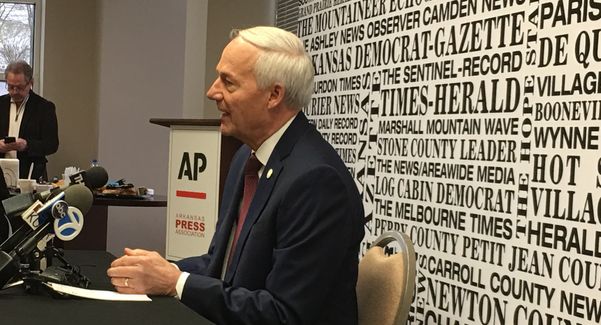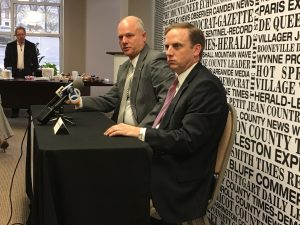Governor: Shutdown’s effects limited, but state could eventually step in
by January 11, 2019 3:09 pm 1,012 views

On the day the federal government shutdown tied the record for being the longest ever, Gov. Asa Hutchinson said few Arkansas state services have been affected. But the state could take over some current federal responsibilities if the shutdown continues.
Hutchinson said Friday (Jan. 11), that the shutdown led to a temporary furlough of six federally funded Arkansas State Crime Lab employees who process Drug Enforcement Agency evidence. He said they were furloughed a couple of days but oddly brought back to work. Ten Department of Finance and Administration employees who manage federal funds remain furloughed, creating a hardship on those families, he said.
He said the shutdown has also affected the Department of Homeland Security, which means it has affected Transportation Security Administration workers, Border Patrol agents and other immigration officials who are not being paid. If the shutdown continues, it will affect other government operations, such as the Supplemental Nutrition Assistance Program.
Hutchinson said state government might begin to assume some federal government duties if the shutdown lingers, such as maintenance of the Buffalo National River and supporting domestic violence shelters.
He hopes the shutdown ends quickly but is dubious of President Trump declaring a national emergency, which he said would set a bad precedent and should occur only as a last resort.
President Trump, he said, “has done an amazing job and an important job in educating Americans about the need and the humanitarian crisis and the need for enhanced border security.”
Hutchinson agreed with Arkansas Republican Sens. John Boozman and Tom Cotton, who were quoted in Friday’s Arkansas Democrat-Gazette saying the United States should bolster the E-Verify system that would make it harder for employers to hire undocumented immigrants.
Hutchinson made his comments during a visit with reporters at the Arkansas Press Association sponsored by the APA and the Associated Press. His appearance was preceded by one featuring Senate President Pro Tempore Jim Hendren, R-Sulphur Springs, and Speaker of the House Matthew Shepherd, R-El Dorado.

SESSION START
In other business, Hutchinson and the two legislative leaders said lawmakers are still trying to build consensus on a highway plan, and they said they expected the state’s Arkansas Works program to be funded without significant difficulty.
Hutchinson said during his recent re-election campaign that he wants to refer a highway plan to the voters.
“It has to be a big plan,” he told reporters. “Of course, my definition of a big plan is $200 million, but the definition of other people’s big plan is $400 million, and so that’s one of the challenges is you’ve got to arrive at the right level of plan that meets needs but also is something that the voters of Arkansas and the legislators can support.”
He said that $200 million is not necessarily the right size plan.
Hendren said the Legislature could raise taxes, divert money currently spent elsewhere, and/or refer a proposal to the voters. The solution most likely will include a combination of those items.
“Of all the big issues, I would say that’s the one that is still the most fluid,” he said. “We all agree on the goal. There’s overwhelming support in the Legislature for highways. Everybody wants the ice cream, but nobody wants to get fat.”
While the governor campaigned on presenting a highway plan to the voters, he is deferring to legislators at this point. He told reporters, “The Legislature wants to take more ownership of that, and so I’m yielding to them to take some ownership and see what kind of plan that they come up with.”
Hendren said legislators will have to make difficult political decisions, so it will be better to decide how to do so rather than simply follow the governor’s dictate to “take one for the team.”
Shepherd said that while “everything has to be on the table,” he would prefer starting with whatever internal revenue is already available.
Hutchinson expects legislators will approve funding for the Division of Medical Services, which administers Arkansas Works.
Arkansas Works is a federal-state expansion of the Medicaid population serving lower-income Arkansans. It was created by the Affordable Care Act, otherwise known as Obamacare. As of Dec. 1, it covered 235,385 Arkansans.
Unlike other states, Arkansas uses federal dollars to purchase private health insurance for recipients. Opponents still consider it Obamacare and have tried in the past to kill the program by denying funding for the Division of Medical Services. All appropriations require a three-fourths vote, a high bar.
Hutchinson obtained a waiver from the Trump administration to allow the state to require some recipients to work or engage in work-related activities. That requirement reduced the rolls by 16,932 who failed to comply in 2018, but everyone who has lost coverage can reapply as of Jan. 1.
The waiver has been challenged in federal court under the same judge who previously nullified a Kentucky work requirement. A decision could come early this year at about the same time that legislators are debating funding the Division of Medical Services.
Hutchinson said he doesn’t expect too much difficulty in reauthorizing funding for the program.
“I don’t see a controversy over the appropriation bill for Arkansas Works,” he said. “I think it’s settled into our health care system in Arkansas with the reforms that have been put into place and with the work requirement that has now been in place for almost six months.”
Hendren and Shepherd both said they have heard less talk regarding legislative opposition than they have heard in the past at this point.
“I may be wrong,” Hendren said. “I have seen the drama coming before, and we’ve had the drama. I just don’t see it coming this time. I don’t see a lot of appetite out there to start playing shutdown politics with budgets.”
Hutchinson said he doesn’t expect the lawsuit to interrupt funding for Arkansas Works. He expects the work requirement to be upheld at the district court level or at the appellate level.
“By the time the court makes a decision, it will be in operation nine months, and I think that will be difficult to disrupt,” he said.
He said another three months of the work requirement will provide more information about how the program has functioned.
Hendren said lawmakers will not change the legislative timetable because of the court case. Instead, they will respond to whatever the court rules.
“If there is a ruling that changes the validity of the work requirement, I do not think it would mean the end of the program,” Hendren said. He added that losing Arkansas Works would throw the state budget as well the lives of Arkansas Works recipients into “turmoil.”
